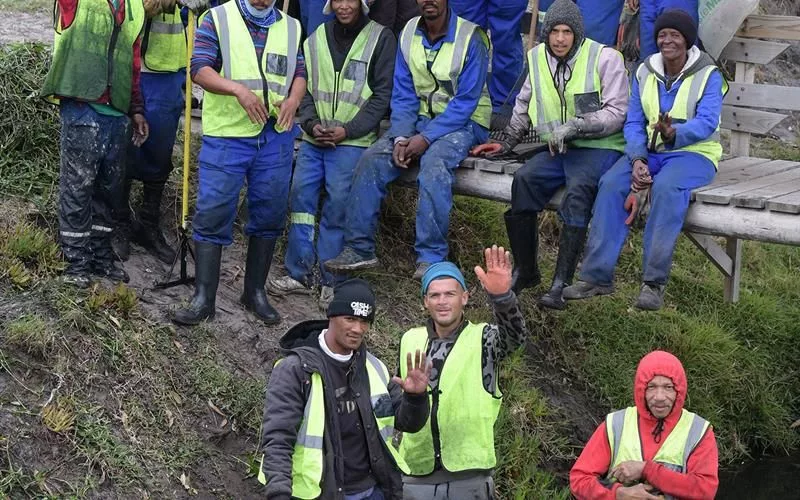Misha Abarder, an 11-year-old girl, has shown incredible resilience and determination in pursuing her dreams of playing football. Despite facing discouragement and neglect from coaches and peers, she persevered and has been selected for the Western Province’s Schools Metro Central girls’ team. Her journey serves as a beacon of hope for other girls and is an embodiment of the shifting attitudes towards girls’ empowerment. Misha’s story ignites a spark of inspiration for every girl dreaming of success in a world that is gradually but steadily opening up to them.
Misha Abarder is an 11-year-old girl making significant headway in the world of football. Her journey of tenacity and resilience resulted in her selection for the Western Province’s Schools Metro Central girls’ team. Misha’s story is an embodiment of the shifting attitudes towards girls’ empowerment, serving as a beacon of hope for other girls.
The Inspiring Story of Misha Abarder
In a time when the fight against gender inequality is gaining momentum, society is gradually beginning to overthrow its bias against girls. One tangible evidence of this progress is the compelling story of Misha Abarder, an 11-year-old girl making significant headway in the world of football.
Misha’s narrative is characterized by sheer willpower and resilience. Despite not being the most skillful player in her team, her relentless chase of her dream speaks volumes. She has overcome hurdles that could have demoralized many grown-ups, exhibiting an awe-inspiring level of resilience.
The unwavering dedication she has shown towards football has led her to progress from playing with boys to competing in an all-girls league, serving as a representative for her school and club. Her experience playing against boys has not only sharpened her skills but also strengthened her character. Much like a diamond molded under pressure, her journey through trials has only magnified her shine.
Misha’s Journey of Tenacity and Resilience
Misha’s steadfast tenacity resulted in her selection for the Western Province’s Schools Metro Central girls’ team. She is currently on the brink of a golden opportunity to represent her team in international tournaments in either Dubai or Malaysia – a tribute to her unwavering tenacity and a beacon of hope for all young girls who dare to dream.
Misha has experienced discouragement, mockery, and even straight-up neglect from her coaches and peers. Yet, she continued her passionate pursuit of football, demonstrating that a love for the game is a power that can overcome all odds.
Her leadership qualities, which were honed on the field, have not been overlooked. Misha’s vocal leadership and her unrivaled experience in competitive play resulted in her being appointed as the captain of two teams, both of which have performed commendably against older and larger opponents, securing victories through sheer determination.
The Path to Success and the Obstacles Faced Along the Way
Nevertheless, the journey to success for girls, whether on the football field, in the boardroom, or in life, is full of challenges. Biases, prejudices, and safety concerns are some of the many hurdles every girl must overcome.
This reality resonates with parents of girls all over the world. A South African woman lives with a heightened awareness of potential threats lurking around every corner, a fact that men often overlook.
In this context, Misha’s story becomes even more significant. There are many heroes in Misha’s journey, those who have advocated for girls’ football and fought for inclusivity and opportunity.
Figures like Bassier Ellis, who introduced Misha to a community club launching a girls’ soccer team, and Iqbal Kasker, the tireless chairperson of Salt River Blackpool Football Club, who advocated for the girls’ inclusion despite numerous challenges. Harold Potz, a forerunner in junior girls’ football, is another notable name.
These individuals, along with other proponents of girls’ soccer, have cultivated a supportive and motivating environment for girls like Misha to thrive. Their ceaseless efforts starkly contrast the lack of support from the South African Football Association, which has been condemned for failing to establish junior girls’ soccer leagues despite considerable achievements by the women’s national team.
Misha’s Journey: A Beacon of Hope and Resilience
Misha stands at the intersection of a legal career and professional football as she continues her promising journey, a crossroads that offers the best of both worlds. Her journey serves as a beacon of hope for other girls. It is a reminder that they need not step back for anyone and a testament to the power of determination and resilience.
Misha’s story is an embodiment of the shifting attitudes towards girls’ empowerment. As she continues to carve out her path, she ignites a spark of inspiration for every girl dreaming of success in a world that is gradually but steadily opening up to them. A new age is dawning, and it casts a warm glow on the future female trailblazers of the world.
1. Who is Misha Abarder?
Misha Abarder is an 11-year-old girl who has made significant headway in the world of football despite facing discouragement and neglect from coaches and peers.
2. What makes Misha’s story significant?
Misha’s story is significant because it is an embodiment of the shifting attitudes towards girls’ empowerment, serving as a beacon of hope for other girls.
3. What obstacles has Misha faced in her journey?
Misha has faced discouragement, mockery, and even straight-up neglect from coaches and peers. She has also had to overcome biases, prejudices, and safety concerns.
4. Who are some of the proponents of girls’ soccer?
Figures like Bassier Ellis, Iqbal Kasker, and Harold Potz are some of the proponents of girls’ soccer who have cultivated a supportive and motivating environment for girls like Misha to thrive.
5. What opportunities has Misha been given?
Misha has been appointed as the captain of two teams and has been selected for the Western Province’s Schools Metro Central girls’ team. She is also on the brink of a golden opportunity to represent her team in international tournaments in either Dubai or Malaysia.
6. What does Misha’s story represent?
Misha’s story represents the power of determination and resilience. It is a reminder that girls need not step back for anyone and serves as a spark of inspiration for every girl dreaming of success in a world that is gradually but steadily opening up to them.












